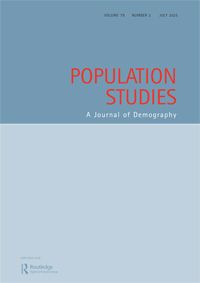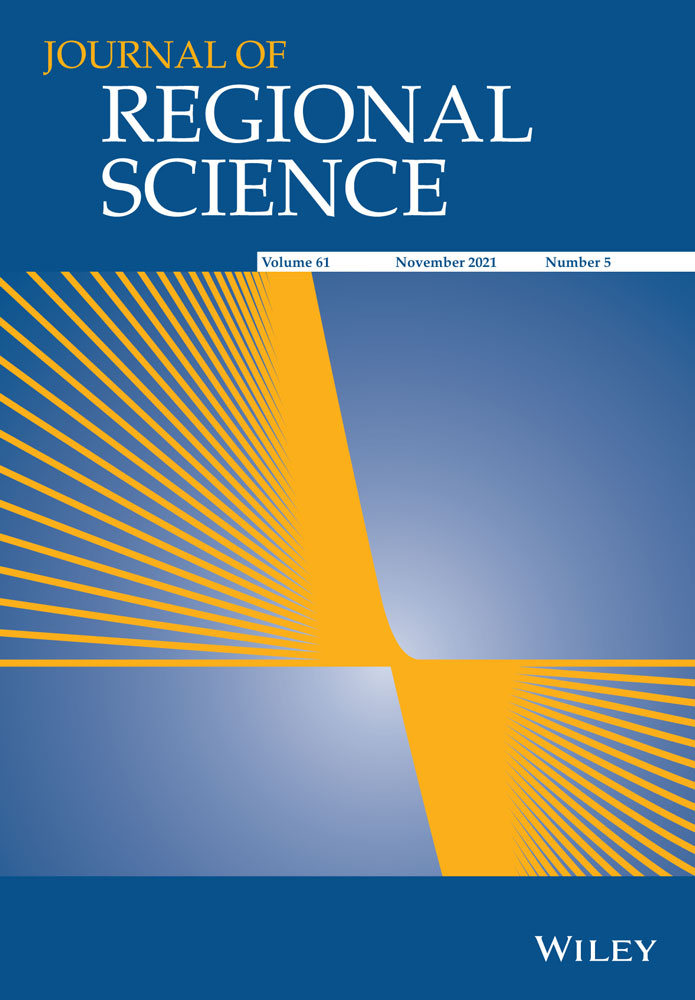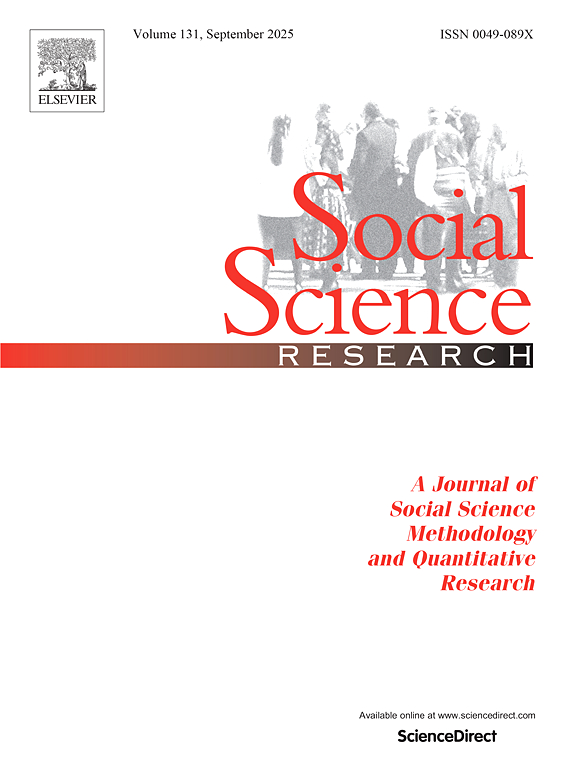Publications
2022
-
 Employment uncertainty and fertility intentions: Stability or resilience?Population Studies, 2022, 76(3), pp. 387–406
Employment uncertainty and fertility intentions: Stability or resilience?Population Studies, 2022, 76(3), pp. 387–406The role of employment uncertainty as a fertility driver has previously been studied with a limited set of constructs, leading to inconclusive results. We address this oversight by considering perceived stability of employment and perceived resilience to potential job loss as two key dimensions of employment uncertainty in relation to fertility decision-making. The present study relies on the 2017 Italian Trustlab survey and its employment uncertainty module. We find that perception of resilience to job loss is a powerful predictor of fertility intentions, whereas perception of employment stability has only a limited impact. The observed relationship between resilience and fertility intentions is robust to the inclusion of person-specific risk attitude and does not depend on the unemployment rate or the share of fixed-term contracts in the area of residence. We conclude that the notion of employment uncertainty includes distinct expectations towards the future, which should be considered separately to understand fertility decision-making.
2021
-
 Was Banfield right? New insights from a nationwide laboratory experimentwith Arnstein Aassve and Pierluigi ConzoJournal of Regional Science, 2021, 61(5), pp. 1029–1064
Was Banfield right? New insights from a nationwide laboratory experimentwith Arnstein Aassve and Pierluigi ConzoJournal of Regional Science, 2021, 61(5), pp. 1029–1064Abstract Since the pioneering study by Banfield, the North-South gap in Italian social capital has been considered by international scholars as an example of how cultural diversity within a country can generate different developmental outcomes. Most studies, however, suffer from limited external validity and measurement error. This paper exploits a new and representative online lab-experiment to assess social-capital patterns in Italy. Unlike previous experiments, we do not inform participants about the geographic origins of their counterparts. This feature allows us to assess the North-South gap in universal, as opposed to parochial, behavior. Results suggest that Southerners and Northerners do not systematically differ in generalized prosocial preferences. Only trustworthiness is higher among. Northerners, while they are statistically similar to Southerners in many other economic preferences such as cooperation, trust, expected trustworthiness, altruism, and risk tolerance. We also show that the gap in trustworthiness stems from the lower reciprocity of Southerners in response to large transfers, and it is characterized by the intergenerational transmission of norms. Possible policy implications are discussed.
2020
-
 The impact of gynecologists’ conscientious objection on abortion accesswith Tommaso Autorino and Letizia MencariniSocial Science Research, 2020, 87, 102403
The impact of gynecologists’ conscientious objection on abortion accesswith Tommaso Autorino and Letizia MencariniSocial Science Research, 2020, 87, 102403Although abortion in Italy is free of charge and legal in a broad set of circumstances, 71% of gynecologists are registered as conscientious objectors, i.e. they are exempted from performing abortions for reasons of religious or moral beliefs. To assess whether this practice limits abortion access, we analyze aggregate regional data on abortion and a dataset of over one million clinical records of single interventions performed between 2002 and 2016. Results, from both cross-regional panel data and microdata analysis, suggest that conscientious objection hampers abortion access at the local level, being a significant driver of a woman’s decision of having an abortion out of the region of residence and leading to longer waiting times to have one. Conscientious objection appears to have a stronger impact on women living in lower-income regions or experiencing other forms of economic disadvantage.
Working Papers
- The Demographic Impact of Leadership: Mayoral Education and COVID-19 Excess Mortality in Italywith Alessandra Minello and Tommaso Nannicini
This paper investigates whether the characteristics of locally elected officials influenced excess mortality during the COVID-19 pandemic. Using data on Italy, one of the first countries to be severely affected, we examine whether mayoral education influenced municipal-level mortality outcomes. We estimate weekly excess mortality using official death statistics and a Bayesian hierarchical spatio-temporal model. To address endogeneity in political selection, we implement a close-election Regression Discontinuity Design. We find that college-educated mayors significantly reduced mortality during the first wave of the pandemic, by lowering both the likelihood of excess deaths and the excess mortality rate. These effects are not observed in the second wave, likely due to policy convergence and a stronger role played by national and regional institutions. Our design interprets education as a proxy for broader leadership traits, such as decision-making capacity under uncertainty. The findings underscore that political selection can have real demographic consequences, shaping population outcomes during crises.
- Cultural Values and Contemporary Welfare Provisionwith Arnstein Aassve and Ross Macmillan
The ongoing cultural resurgence in contemporary sociology points to a tension between the types of culture as explanations of social action. In macro-sociology, a key issue is whether the drivers of social dynamics reflect global culture that is procedural in nature, or resemble local nation-based culture that is evaluative and indicative of norms and values. One area where such tensions are inherently problematic is in explanations of social welfare expenditure. While global culture emphasizes and demonstrates similarity of structure and process across countries, welfare expenditure shows wide country variation. Although local culture is an obvious possible source of such variation, there has been no systematic comparative studies of its relevance with credible causal inference. Constructing a unique dataset and using an innovative methodology, this study operationalizes aspects of local culture in terms of values that are defined by trust, gender equality, and familism, which are held up against a measure of global culture. We examine their impact on welfare expenditure for the period 1960 to 2010 by circumventing problems of endogeneity and reverse causality. Our research contributes to the study of culture and values, social welfare differences across countries, and the origins and operations of contemporary nation-state systems.
Works in Progress
- Sounds of Silence: Electoral Consequences of Turnout Decline and Access-based Selective Demobilization
Declining voter participation has raised concerns about the responsiveness and sustainability of democratic systems. Research into the consequences of turnout variations provides mixed evidence and mostly rely on debated weather-induced shocks for identification. I shed new light and revisit classic hypotheses on this topic by studying the effects of a reform that suddenly cut polling stations by 30% in Italy as part of broader fiscal consolidation measures. Leveraging variation at the municipality level in a fuzzy difference-in-differences design combined with a new Wikipedia-based measure of political ideology, I provide causal evidence on the intertwined relationship between voting access, participation, and electoral outcomes. Potential mechanisms are explored through the analysis of precinct-level and geo-referenced individual survey data. The paper provides three main contributions. First, restricting voting access determines a decline in voter participation that is habit-forming. Second, lower participation is driven by demobilization of marginal voters with specific attitudes towards politics and economy, who show higher voting-cost elasticity. Third, the exogenous reduction in turnout induces a persistent rightward shift in the political position of the electorate, redistribute vote shares from extreme to moderate party groups, lowers polarization, and boosts support for populist parties.
- This Must Be the Place: Switching Ideology and Electoral Accountability
Do voters reward or punish ideological shifts of politicians at the ballot box? This paper examines the electoral consequences of ideological party switching through the lenses of accountability theory. While prior research has produced mixed findings - primarily focusing on high-level elections and often conflating ideological change with performance - this study isolates the ideological component of switching. Using data from local elections in Italy, a context marked by frequent party switching and pronounced political polarization, I assess the re-election prospects of incumbent politicians who change ideological poles suring their term in office compared to those who remain ideologically consistent. Leveraging detailed administrative data to measure performance, the analysis reveals an electoral penalty for ideological switchers between 4 and 12 percentage points. My findings underscore the symbolic importance of ideological congruence in retrospective voting. Switching ideology emerges as an electoral liability highlighting the electoral salience of ideological consistency , an overlooked dimension of accountability in democratic politics.
- The Efficiency of Female Leaders in Local Public Administrationswith Arnstein Aassve
The study addresses the performance of female mayors in local administrations. We use detailed data from Italian municipalities over an extended time period and a Sharp Regression Discontinuity design. Results suggest that women winning close mixed-gender elections reduce the size of local government. Female mayors spend less, especially on local bureaucracy, roads services, and urban planning. They do so by relaxing budget rigidities and by limiting wasteful spending. Commensurate with this pattern, they also collect less revenue. In particular they impose a lower tax burden and charge lower fees for public services compared to male mayors, resulting in lighter financial impositions on citizens. Despite lower resources being available, female-headed municipalities are better able to maintain the same level of services for the public. The study suggests that female mayors are more efficient than their male counterparts in running local administrative machinery. Female mayors do not have better chances of re-election, but the efficiency gains from having had a female mayor appear to be long lasting.
- Cuts in Public Spending and Mortality: Causal Evidence from Italian Municipalities
Does austerity really kill? Vis-à-vis an expanding literature uncovering several adverse health outcomes of cuts in public spending, convincing causal evidence is still lacking. In this paper, we leverage an unexpected variation in the Italian Domestic Stability Pact, introduced in 2011, which forced Italian municipalities within a certain population threshold to suddenly cut public expenditure. We find that the unexpected budget tightening led to an instantaneous increase in mortality rates. Adverse health effects are heterogeneous across age groups, with the elderly being the most affected, and geography, with municipalities in more deprived areas suffering the most. These findings allow us to have a better understanding of the opportunity-costs of expenditure-based fiscal consolidation. Critical appears to be not only whether budget cuts are preferred to tax increases, but which cuts are chosen within the budget menu.
- Political Consequences of Youth Enfranchisement